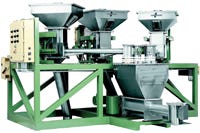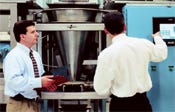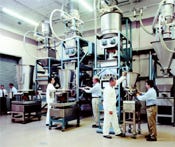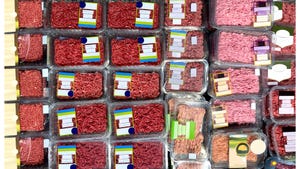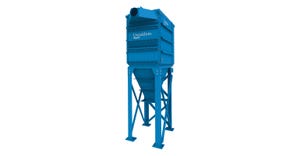Metal Coating Technologies Provide Critical Edge
December 19, 2007
|
Acrison uses metal coating technologies to maintain its competitive edge. |
Acrison Inc. is a leader in dry bulk solids handling, specifically the precision metering of dry solid ingredients by volume or weight and the closely related proportioning, blending, storage, and hoppering of these materials. Metal coatings play a critical part in the performance of Acrison products primarily because of the variety of applications its products serve.
“The principal issue is the reduction of friction on our metal feeders to prevent the materials from sticking,” says Paul Matarazzo, Acrison’s senior mechanical engineer. “Coatings with a lower coefficient of friction (COF) prevent buildup on the machinery, and in cases where materials such as pigments are used, accuracy is critical because any error will directly affect the end product. Obviously this can have huge cost implications—for example, in the manufacture of automotive parts or consumer products, where the color of the part is extremely important.
“Pigments themselves are also extremely expensive, especially in the food industry where color additives are being used. The food industry also has its own unique issue. Any of the coatings we use have to be FDA or USDA approved, and we serve many customers in the food manufacturing industry.”
|
Magnaplate’s friction-reducing coatings also increase blending accuracy, which is critical when color pigments are used. |
Abrasion of machinery from certain dry bulk solids can also create issues for customers, as well as additional expense. “Certain materials will cause abrasion, and this kind of damage not only leads to costly production downtime but can also mean expensive replacement parts,” Matarazzo adds. “Tungsten carbide and silicon-type materials are particularly abrasive, leading to meter and feeder damage.
“In other cases, our customers have applications where materials will react with stainless steel, which is an issue because most of our parts are made from stainless steel. Chlorides like ammonium or stannous chloride will react, causing corrosion and even pitting on the steel—a real issue for companies such as pool-chemical manufacturers. The reaction between the materials can also contaminate the original material, so the right coating is imperative.”
Acrison also uses metal coatings for applications that require a release property in high-temperature situations, such as feeding metal into a furnace at up to 1000°F. Such applications require coatings that are able to withstand high temperatures while providing functionality, unlike Teflon.
Generally speaking, when equipment is manufactured, four main coating options are available to Acrison: chrome coating, ceramic coating, Acrison’s own in-house coatings, and coatings that are provided by a proprietary metal coating provider, General Magnaplate Corp.
Given the available options, it may be asked why Acrison outsources coatings, since it is traditionally the case that outsourcing parts is more expensive than performing in-house coating and is also time-consuming.
|
Magnaplate’s low-coefficient-of-friction coatings prevent buildup on feeders and reduce abrasion. |
“General Magnaplate has built a reputation similar to ours as industry experts that you use not only to provide a product but to solve engineering applications as well,” says Matarazzo. “Because of their immense industry experience, they are able to provide us with release coatings that outperform others available in the marketplace, and they provide a much lower COF. Our relationship with Magnaplate is another weapon in our arsenal when a customer comes to us with a problem to solve. It’s another way for us to underscore our reputation and ensure high levels of customer satisfaction.
“Recently we had a customer whose materials were reacting with our steel parts in a rubber compounding application, so we turned to Magnaplate to solve the problem. If they do not have a coating available to solve the problem, then they’ll engineer one that custom fits the application.”
Magnaplate provides a wide variety of proprietary coatings, many of which meet strict federal standards such as FDA and USDA compliance. This enables Acrison to better serve the food and related industries. Most importantly, however, Magnaplate’s coatings prolong the life of metal parts.
“Some of the machinery we produce is expected to survive 20 years, being used on a grueling daily schedule, and we need to provide customers with minimum downtime and a low cost of ownership,” says Matarazzo. “If a feeder is processing 100,000 lb/hr, every hour it is not operating is extremely costly for the customer.
“In one instance we installed a feeder in Chicago in 1963, and today it’s still going strong without even replacing an auger. Magnaplate’s coatings are designed to increase the life span of metal parts, and their technology enables us to have utter confidence with our customers. It does help that our customers are very familiar with the Magnaplate name—that in itself breeds confidence.”
For more information on metal coating provider General Magnaplate Corp., visit www.magnaplate.com. For more information on Acrison Inc. and its dry bulk solids handling offerings, visit www.acrison.com.
You May Also Like
